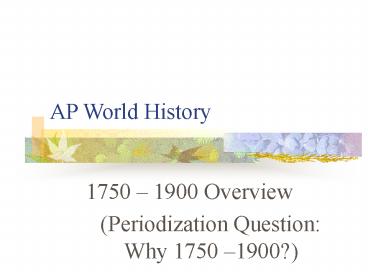AP World History - PowerPoint PPT Presentation
1 / 28
Title: AP World History
1
AP World History
- 1750 1900 Overview
- (Periodization Question Why 1750 1900?)
2
Changes in Global Commerce, Communication and
Technology
- Patterns of World Trade
- Who, where, what, how in 1750?
- What will and wont change by 1910?
3
Changes in Global Commerce, Communication and
Technology
- Modes of Transportation/ communication
- Impact of railroad, steam, telegraph
- Suez Canal, Panama Canal
4
Suez Canal
Suez canal opened in 1869
5
Changes in Global Commerce, Communication and
Technology
- Industrial Revolution
- Origins of I.R. where, what
- and when
- Rationale of capitalism
- Adam Smith
- Impact of I.R. on time, family,
- work, labor
- Relationship of nations during I.R.
- Intellectual responses to I.R. Marxism,
socialism
6
Power loom
Fatcat
Milltown
Miner
Streetchildren
7
Demographic and Environmental Changes
- Migration Immigration
- Why?
- Where?
8
Demographic and Environmental Changes
- End of Atlantic Slave Trade
- New Birthrate Patterns
- Disease prevention
- and eradication
- Food Supply
9
Changes in Social and Gender Structure
- Industrial Revolution
- Commercial developments
- Tension between work patterns and ideas about
gender - Emancipation of Serfs
- and Slaves
10
Changes in Social and Gender Structure
- Womens emancipation movements
11
Political Revolutions and Independence Movements
- Latin American Independence Movements
- Why?
Simon Bolivar
12
Political Revolutions and Independence Movements
- Revolutions
- Why Revolution now?
- Where?
- United States (1776)
- France (1789)
- Haiti (1803)
13
Political Revolutions and Independence Movements
- Haitian Revolution
Toussaint LOuverture
14
Political Revolutions and Independence Movements
- Mexican Revolution
15
New Political Ideas
- Rise of Nationalism
- Growth of Nation-states/ empires
16
New Political Ideas
- Movements of Political Reform
- Jacobins in France
- Taiping Rebellion in China
17
New Political Ideas
- Rise of Democracy and its limitations
- Reform
- Women
- Racism
- Social Darwinism
- Herbert Spencer
18
Rise of Western Dominance
- Patterns of Expansion
- Imperialism and Colonialism
- African continent, much of Asia, and Oceania
- Ethiopia and Siam
- Hawaii and New Zealand
19
Rise of Western Dominance
- Scramble for Africa
20
Rise of Western Dominance
- Economic, Political, Social, Cultural, Artistic
21
Rise of Western Dominance
- Cultural and Political Reactions to western
dominance (reform, resistance, rebellion, racism,
nationalism) - Japan Commodore Perry and Meiji Restoration
- Russia Reforms and Rebellions
- Siam and Ethiopia-- defensive modernization
- China--Boxer Rebellion
- Islamic and Chinese responses compared
- Impact of Changing European Ideologies on
Colonial Administrations
22
Rise of Western Dominance
- Japan Commodore Perry and Meiji Restoration
23
Rise of Western Dominance
- ChinaBoxer Rebellion
24
Diverse Interpretations
- Modernization theory debates
- Cause of serf and slave emancipation?
- Nature of womens roles at the time in industrial
areas? In colonial societies? Elite versus lower
class?
25
Comparisons
- Industrial revolution in western Europe and Japan
(causes and early phases) - Revolutions (American, French, Haitian, Mexican,
and Chinese) - Reaction to foreign domination in Ottomans
empire, China, India and Japan.
26
Comparisons
- Nationalism
- Forms of intervention in 19th century Latin
America and Africa - Roles and conditions of upper/ middle versus
working/ peasant class women in western Europe
27
European women 19th century
Queen Victorias family
British family in India
Russian peasant family
28
Conclusions
- What are the global processes that are at play?
Which have intensified? Diminished? - Predict how the events of the 19th century are a
natural culmination of earlier developments. - Speculate what historical events in the 19th
century would have most surprised historians of
earlier eras.































